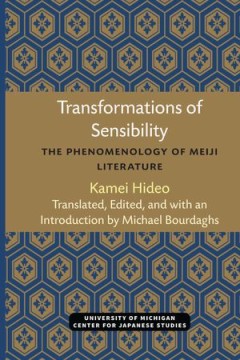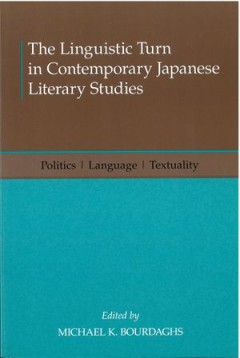Filter by

Transformations of Sensibility: The Phenomenology of Meiji Literature
First published in Japan in 1983, this book is now a classic in modern Japanese literary studies. Covering an astonishing range of texts from the Meiji period (1868–1912), it presents sophisticated analyses of the ways that experiments in literary language produced multiple new—and sometimes revolutionary—forms of sensibility and subjectivity. Along the way, Kamei Hideo carries on an exte…
- Edition
- -
- ISBN/ISSN
- 9780472901425
- Collation
- -
- Series Title
- -
- Call Number
- 895.6 KAM t

The Linguistic Turn in Contemporary Japanese Literary Studies : Politics, Lan…
The 1970s and 1980s saw a revolution in Japanese literary criticism. A new generation of scholars and critics, many of them veterans of 1960s political activism, arose in revolt against the largely positivistic methodologies that had hitherto dominated postwar literary studies. Creatively refashioning approaches taken from the field of linguistics, the new scholarship challenged orthodox interp…
- Edition
- -
- ISBN/ISSN
- 9780472901432
- Collation
- -
- Series Title
- -
- Call Number
- 895.609 382 LIN

The Linguistic Turn in Contemporary Japanese Literary Studies: Politics, Lang…
The 1970s and 1980s saw a revolution in Japanese literary criticism. A new generation of scholars and critics, many of them veterans of 1960s political activism, arose in revolt against the largely positivistic methodologies that had hitherto dominated postwar literary studies. Creatively refashioning approaches taken from the field of linguistics, the new scholarship challenged orthodox interp…
- Edition
- -
- ISBN/ISSN
- 9780472901432
- Collation
- -
- Series Title
- -
- Call Number
- 895.6 LIN l
 Computer Science, Information & General Works
Computer Science, Information & General Works  Philosophy & Psychology
Philosophy & Psychology  Religion
Religion  Social Sciences
Social Sciences  Language
Language  Pure Science
Pure Science  Applied Sciences
Applied Sciences  Art & Recreation
Art & Recreation  Literature
Literature  History & Geography
History & Geography